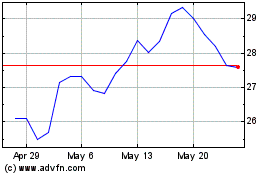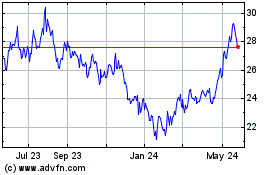China Internet ETF: The Best Choice in the Space? - ETF News And Commentary
March 14 2014 - 9:00AM
Zacks
After witnessing 30 years of stellar economic growth, the Chinese
economy has been going through a choppy phase for quite some time
now. If we ignore some occasional upbeat data from the last 1.5
years, one has to question the health of the world’s second largest
economy.
The nation saw weakened growth for 2013 to hit 14-year lows. China
snapped a growth rate of 7.7%, which came a little above the market
expectation of 7.6% expansion. Notably, analysts’ expectations for
growth were the slowest since 1999.
For 2014, the Chinese government has targeted 7.5% growth rate,
though this muted growth projection comes at the cost of new
reforms in China, as per the government, while recent export
figures haven’t helped either (read: China ETFs Tumble to Start
2014).
Quite expectedly, this near-term gloomy outlook has punished most
of the China ETFs this year, as the vast majority are seeing modest
losses to start 2014. However, only one sector -- technology – has
held up pretty well in this downslide, with
Guggenheim
China Technology ETF (CQQQ) and
Global X China
Technology ETF (QQQC) returning just under 10.0%.
And beyond these, the China Internet ETF
CSI China Internet
ETF (KWEB) has also edged past the other two tech ETFs
gaining as much as 21% this year. This is why the space demands
close attention, especially given the broad weakness in other
corners of the Chinese market.
What’s Behind This Bullishness?
China is possibly the most important emerging market and has ample
room for expansion in the technology sector that will support its
journey toward becoming a developed nation. Internet penetration is
still low in China though people are embracing e-commerce
activities and PC sales are increasing, thus urging the nation to
go for further technological advancements.
China recorded 618 million Internet users to close out 2013 and 500
million mobile Internet users. The Internet penetration rate in
China also increased to 45.8% in 2013 from 42.1% in 2012. To
leverage this growing demand in the sector, China aims its
technology sector to contribute 5% of GDP now, 8% in 2015 and 15%
by 2020.
Several market analysts believe that market capitalizations of
Chinese Internet companies are contesting hard with the largest
U.S. and global industry players (read: Guide to China Technology
ETFs).
KWEB in Focus
This ETF is a rather new member in the China ETF space, having
forayed into the market on July 31 of 2013 and accumulated more
than $75.0 million in assets within such a short span. The ETF is
exposed to the companies doing business in the segments like
Internet software, home entertainment and educational software,
commercial or retail services primarily provided online, and
development of mobile Internet software or mobile Internet
services.
All companies are based in China or derive at least 50% of their
revenues from Mainland China. About 60% of the 30-holdings
portfolio is invested in the top 10 stocks indicating that the ETF
carries significant company-specific concentration risk.
Tencent (10.2%), QIHOO 360 (8.8%) and Baidu (7.0%) form the top
three holdings. KWEB charges 68% of expense ratio a year (read:
KraneShares Launches China Internet ETF).
During the launch of this ETF, the issuer noted that since 2000,
Internet spending by urban Chinese has crept up 14% annually as the
country’s rural populace is still migrating to cities thereby
drawing more users to the Internet.
 Bottom Line
Bottom Line
From the chart above, we can see that the Chinese Internet ETF has
breezed past the biggest China ETF
iShares FTSE China 25
Index Fund (FXI), as well as
the
iShares MSCI China Index Fund (MCHI) and
SPDR S&P China ETF
(GXC) over the last
three-month period.
While all three broad market ETFs buckled under pressure and lost
for the time frame, the sole Internet-focused ETF, KWEB, soared in
comparison. No ‘hard landing’, no “QE taper”, no “debt issues” held
back the steadily growing Internet segment as well as the broader
tech space of China.
Of late, China has become a turning point (to a large extent) with
its domestic events either promoting stability to the broader
economy, or pushing other markets into a crisis situation. While we
believe that long-term outlook for the nation is still optimistic
as its government resorted to a slew of reformative measures, many
investors seemed wary of having a Chinese investment in their
portfolio in the near term.
Eventually, KWEB might open up an option to earn huge capital
appreciation out of Chinese stocks, and a way to tap into one of
the quickest growing sectors in the economic behemoth (read: China
ETFs Jump on Government Reform Afterglow).
Want the latest recommendations from Zacks Investment Research?
Today, you can download
7 Best Stocks for the Next 30
Days. Click to get this free report >>
GUGG-CHINA TEC (CQQQ): ETF Research Reports
ISHARS-CHINA LC (FXI): ETF Research Reports
KRANS-C CHN INT (KWEB): ETF Research Reports
GLBL-X NDQ CHIN (QQQC): ETF Research Reports
To read this article on Zacks.com click here.
Zacks Investment Research
Want the latest recommendations from Zacks Investment Research?
Today, you can download 7 Best Stocks for the Next 30 Days. Click
to get this free report
iShares China Large Cap (AMEX:FXI)
Historical Stock Chart
From Nov 2024 to Dec 2024

iShares China Large Cap (AMEX:FXI)
Historical Stock Chart
From Dec 2023 to Dec 2024
